Oct 28, 2025 10:47 AM
In Memoriam: Jack DeJohnette, 1942–2025
Jack DeJohnette, a bold and resourceful drummer and NEA Jazz Master who forged a unique vocabulary on the kit over his…
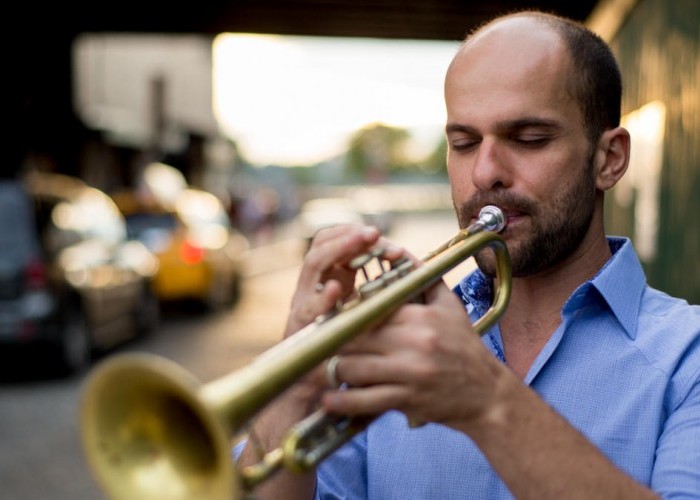
Amir ElSaffar’s most recent recording is Not Two, with his 17-piece Rivers of Sound Orchestra.
(Photo: Michael Crommett)When Amir ElSaffar was growing up in River Forest and Oak Park, Illinois, his father would sneak him into blues clubs; his mother, a lover of classical music, would take him to the symphony.
After studying music at DePaul University, ElSaffar moved to New York, where he immersed himself in studying the santur, a hammered dulcimer, and maqam, a classical Arabic vocal style. Since 2006, the bandleader, who also plays trumpet, has made three albums with his Two Rivers Ensemble, combining that mode of singing and jazz. His latest with the 17-piece Rivers of Sound Orchestra, Not Two (New Amsterdam Records), is a double LP, transcending mere stylistic combinations of melody, resonance and rhythm.
ElSaffar’s Rivers of Sound and Mike Reed’s Flesh & Bone are set to perform at Chicago Symphony Center at 8 p.m. Friday, Feb. 9.
The following has been editing for length and clarity.
Why’d you decide to record Not Two using analog technology?
Because of this ensemble’s instrumental sound combinations and the way that the frequencies interact—it was more a musical decision than a merging of cultures.
I was really looking for how to make an orchestra based on the unique technical qualities of each instrument. So, combining English horn with oud and vibraphone and seeing the relationships that occur sonically, it’s really each instrument carving out its own space in terms of its overtones.
My experience of digital recording is that some of that interaction gets lost. The continuity of analog recording enables this sort of phenomenon to be recorded. Of course every method of recording has its shortcomings, but definitely there’s a physical quality to the sound that is captured in analog recording that I don’t feel in digital recording. That’s why we not only recorded it to tape, but mixed it and mastered it analog. A lot of engineers aren’t willing to work that way; I had to jump through a lot of hoops to make it work.
You titled the album after a Zen koan you learned in order to avoid dualistic thinking. What is it about dualistic thinking, or simply dichotomies, were trying to avoid?
I was talking about not getting into this blending of cultures idea. Musically I’m really not thinking that way anymore.
Sometimes, I don’t know exactly where a melody emerges from when I’m composing it, but there are some acoustic phenomena that just have to do with sound and the way humans relate to sound, certain emotional qualities, certain physical and spiritual states that particular combinations of sounds and rhythms create. Those just seem to occur throughout the world, and I’m interested in tapping into that fundamental of how sound works.
At the moment of creating this music, once you set up a dichotomy that you’re then trying to obliterate, you’ve already set yourself up to stay in that dichotomy. But when you just approach something as being part of a unified whole, then things can flow much more easily.
Do you see any political or cultural import in what you do?
Just to make any music today has a political ramification; it’s saying something. In this case, it’s having Arab, South American, Indian and European musicians, jazz musicians and people from all over the world come together to make music without preoccupation over origin. We’re musicians and we’re engaging in a musical conversation. The idea of this ensemble is imagining a kind of society where people are cooperating or working together to create something that’s beautiful and meaningful and that resonates at a spiritual level.
It’s really transcending, not getting mired, with current political events.
What are your thoughts about coming back and playing in Orchestra Hall?
I used to also play in the Civic Orchestra of Chicago, and we would rehearse at Orchestra Hall several times a week. I was in and out of that building four times a week in my last two years of college. One of my main mentors was Bud Herseth, the principal trumpeter for the Chicago Symphony Orchestra for more than 50 years, whom I studied with there. I played at least 15 concerts on that stage as an orchestra member. My formative years of understanding music, and especially my experience of understanding orchestra, happened there. So, bringing the Rivers of Sound Orchestra to Symphony Center is something meaningful and powerful; it’s kind of a dream for me to be able to do this at Orchestra Hall.
In addition to my own historical and sentimental connections to the place, it’s also just a magnificent space, and the sound in there is tremendous. I’m really honored and psyched to be playing there. DB
For more information about the performance and jazz programming at Symphony Center, visit the CSO website.
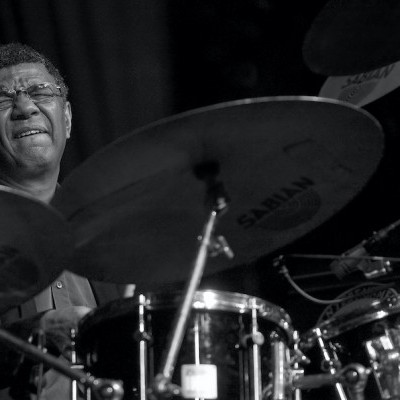
Jack DeJohnette boasted a musical resume that was as long as it was fearsome.
Oct 28, 2025 10:47 AM
Jack DeJohnette, a bold and resourceful drummer and NEA Jazz Master who forged a unique vocabulary on the kit over his…
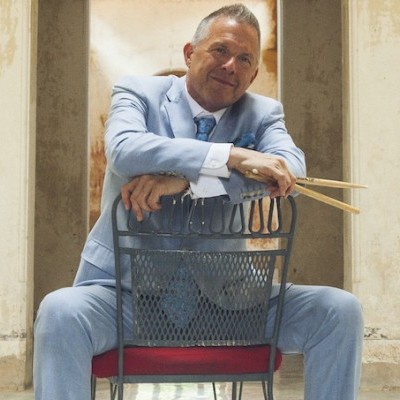
Always a sharp dresser, Farnsworth wears a pocket square given to him by trumpeter Art Farmer. “You need to look good if you want to hang around me,” Farmer told him.
Sep 23, 2025 11:12 AM
When he was 12 years old, the hard-swinging veteran drummer Joe Farnsworth had a fateful encounter with his idol Max…
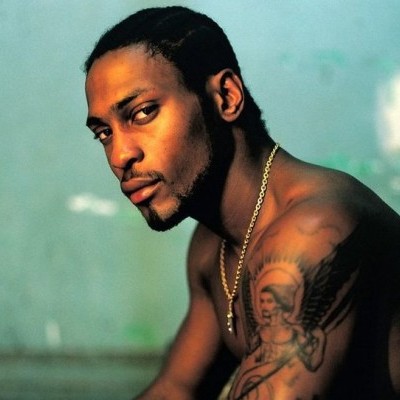
D’Angelo achieved commercial and critical success experimenting with a fusion of jazz, funk, soul, R&B and hip-hop.
Oct 14, 2025 1:47 PM
D’Angelo, a Grammy-winning R&B and neo-soul singer, guitarist and pianist who exerted a profound influence on 21st…
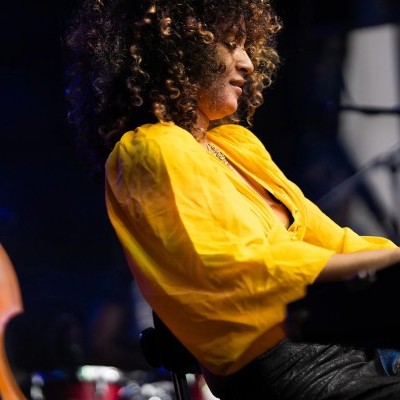
Kandace Springs channeled Shirley Horn’s deliberate phrasing and sublime self-accompaniment during her set at this year’s Pittsburgh International Jazz Festival.
Sep 30, 2025 12:28 PM
Janis Burley, the Pittsburgh International Jazz Festival’s founder and artistic director, did not, as might be…
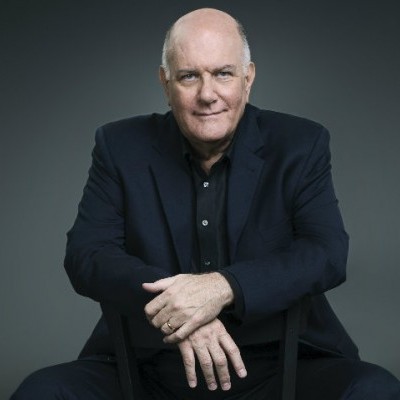
Jim McNeely’s singular body of work had a profound and lasting influence on many of today’s top jazz composers in the U.S. and in Europe.
Oct 7, 2025 3:40 PM
Pianist Jim McNeely, one of the most distinguished large ensemble jazz composers of his generation, died Sept. 26 at…